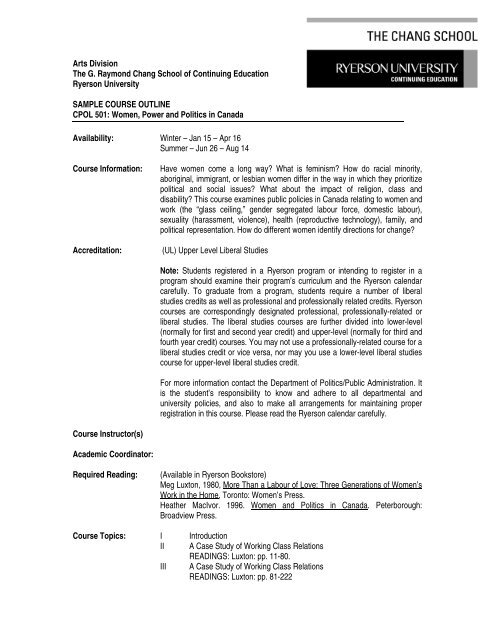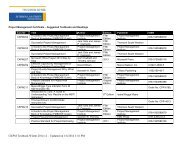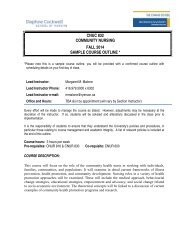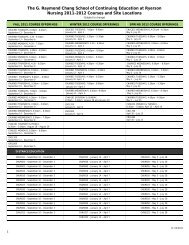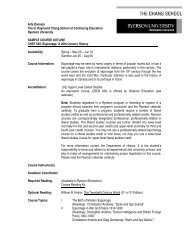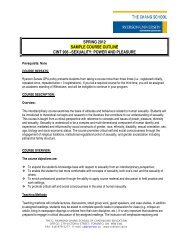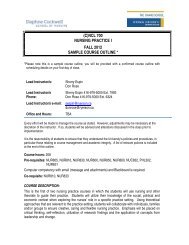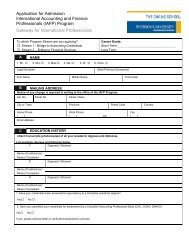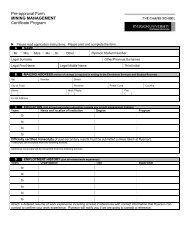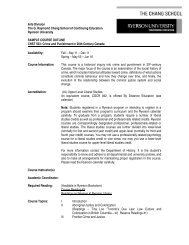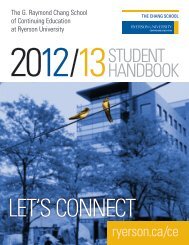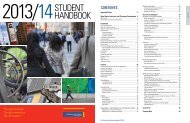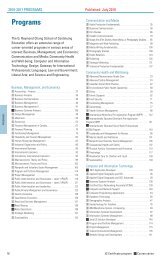CPOL 501 - The Chang School - Ryerson University
CPOL 501 - The Chang School - Ryerson University
CPOL 501 - The Chang School - Ryerson University
Create successful ePaper yourself
Turn your PDF publications into a flip-book with our unique Google optimized e-Paper software.
Arts Division<strong>The</strong> G. Raymond <strong>Chang</strong> <strong>School</strong> of Continuing Education<strong>Ryerson</strong> <strong>University</strong>SAMPLE COURSE OUTLINE<strong>CPOL</strong> <strong>501</strong>: Women, Power and Politics in CanadaAvailability: Winter – Jan 15 – Apr 16Summer – Jun 26 – Aug 14Course Information:Accreditation:Have women come a long way? What is feminism? How do racial minority,aboriginal, immigrant, or lesbian women differ in the way in which they prioritizepolitical and social issues? What about the impact of religion, class anddisability? This course examines public policies in Canada relating to women andwork (the “glass ceiling,” gender segregated labour force, domestic labour),sexuality (harassment, violence), health (reproductive technology), family, andpolitical representation. How do different women identify directions for change?(UL) Upper Level Liberal StudiesNote: Students registered in a <strong>Ryerson</strong> program or intending to register in aprogram should examine their program’s curriculum and the <strong>Ryerson</strong> calendarcarefully. To graduate from a program, students require a number of liberalstudies credits as well as professional and professionally related credits. <strong>Ryerson</strong>courses are correspondingly designated professional, professionally-related orliberal studies. <strong>The</strong> liberal studies courses are further divided into lower-level(normally for first and second year credit) and upper-level (normally for third andfourth year credit) courses. You may not use a professionally-related course for aliberal studies credit or vice versa, nor may you use a lower-level liberal studiescourse for upper-level liberal studies credit.For more information contact the Department of Politics/Public Administration. Itis the student’s responsibility to know and adhere to all departmental anduniversity policies, and also to make all arrangements for maintaining properregistration in this course. Please read the <strong>Ryerson</strong> calendar carefully.Course Instructor(s)Academic Coordinator:Required Reading:(Available in <strong>Ryerson</strong> Bookstore)Meg Luxton, 1980, More Than a Labour of Love: Three Generations of Women’sWork in the Home, Toronto: Women’s Press.Heather MacIvor. 1996. Women and Politics in Canada. Peterborough:Broadview Press.Course Topics: I IntroductionII A Case Study of Working Class RelationsREADINGS: Luxton: pp. 11-80.III A Case Study of Working Class RelationsREADINGS: Luxton: pp. 81-222
IVVVIVIIVIIIIXXXIXIIXIII<strong>The</strong>oretical Perspectives on Women, Power and PoliticsREADINGS: MacIvor, pp. 13-75; 136-151Women and PoliticsREADINGS: MacIvor, pp. 75-85; 324-354Political RepresentationREADINGS: MacIvor, pp. 225-303WorkREADINGS: MacIvor, pp. 95-123Work (cont’d)SexualityREADINGS: MacIvor, pp. 156-217; 360-398FamilyREADINGS: MacIvor, pp. 127-133; 309-320<strong>The</strong> Challenge of DiversityREADINGS: MacIvor, pp. 68-75.<strong>The</strong> Women’s Movement and Feminist Politics: what Future?ReviewAssignments & Exams Test – 25%; Major Paper – 35%; Final Exam – 40%NOTE: Planned alterations in the list of course assignments, tests, approximatedeadlines and in the marking or evaluation scheme, as they appear in the courseoutline shall be discussed in class prior to being implemented.<strong>CPOL</strong> <strong>501</strong>: Women, Power and Politics in Canada 2


